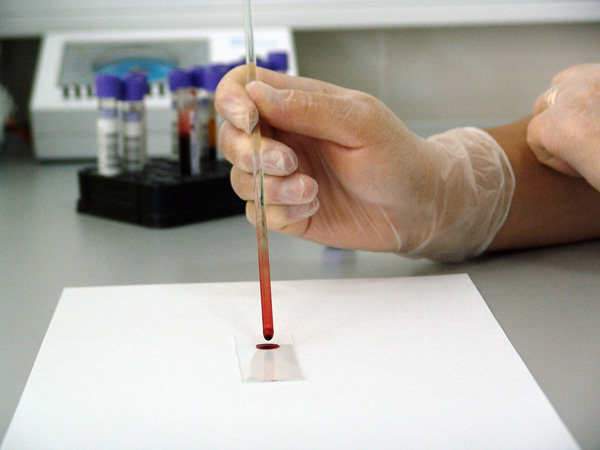“The AI Blood Test” offers hope for early cancer detection

[A picture of a blood sample being held in a laboratory. Photo Credit: Pixabay]
In recent times, a new AI-powered blood test has been garnering widespread attention across the UK for its potential to revolutionize cancer detection.
Currently undergoing trials by the National Health Service (NHS), this machine can diagnose several types of cancer in their earliest stages.
To do so, it only requires a single vial of blood.
The test, known as miONCO-Dx, employs artificial intelligence to analyze fragments of microRNA found in the bloodstream.
MicroRNAs often undergo changes in the presence of cancer cells, allowing researchers to utilize them as a diagnostic tool.
miONCO-Dx is capable of detecting 12 different types of cancer, including colon, lung, breast, pancreatic, and prostate cancer, which are some of the deadliest diseases facing patients today.
Doctors and researchers have long emphasized the importance of early detection in improving cancer survival rates.
Many cancers, when detected early, can be treated more effectively with fewer complications.
However, existing diagnostic methods often rely on invasive procedures, prompting patients to seek medical help only after experiencing symptoms.
Many times, the disease is already in advanced stages, limiting treatment options.
miONCO-Dx presents a non-invasive alternative that could change this narrative.
The test requires only a small vial of blood.
The machine can analyze the sample with up to 99% accuracy in identifying cancer.
According to a report by The Times, the NHS has begun clinical trials involving 8,000 patients nationwide.
If proven effective, the test could become a part of routine health screenings, which would allow patients to detect early-stage cancer before symptoms even appear.
Traditional cancer diagnostics typically require specific tests tailored for each suspected cancer type.
This AI-powered test, however, functions in a "pan-cancer" manner.
This means that the test can detect multiple types of cancer simultaneously using machine learning algorithms to search for unique biological signatures associated with different types of cancer.
This would allow patients to be screened for different types of cancer during a one-time visit to the clinic.
The AI models behind miONCO-Dx are trained on extensive datasets of cancer patients, enabling medical providers to spot subtle changes in blood components.
Such innovation not only saves time and money but also dramatically increases the likelihood of detecting cancer at a treatable stage.
This development could mark the beginning of a new era in medicine, in which AI not only just assists medical providers but becomes a key tool in diagnosing diseases.
Nonetheless, several challenges must be addressed before its widespread use.
The AI model must continue to be refined on diverse datasets to maintain accuracy across all demographics.
Additionally, there are also concerns relating to data privacy and test affordability.
Discussions must be had as to how the new technology can be integrated into the already existing public health system.
Despite the hurdles, optimism is growing.
As public interest in AI in medicine grows, driven by real-world clinical success stories and media coverage, support for AI-integrated healthcare is gaining momentum.
With continued research and ethical development, the AI Blood Test could be the breakthrough that finally makes early, accessible, and accurate cancer detection a global reality.

- Donggeon Kim / Grade 11
- Global Vision Christian School

![THE HERALD STUDENT REPORTERS [US]](/assets/images/logo_student_us.png)
![THE HERALD STUDENT REPORTERS [Canada]](/assets/images/logo_student_ca.png)
